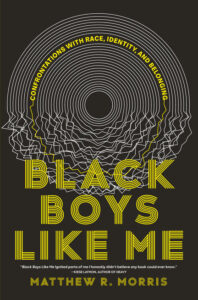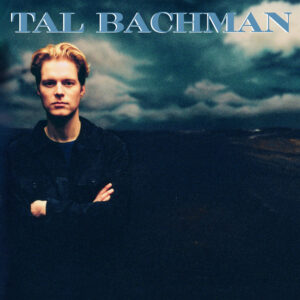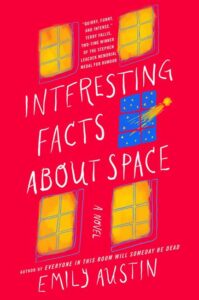February 13, 2024
Black Boys Like Me, by Matthew Morris
Three pages into the first essay in Matthew Morris’s new collection BLACK BOYS LIKE ME: CONFRONTATIONS WITH RACE, IDENTITY, AND BELONGING, and I was hooked, as Morris describes a 4am journey through Brooklyn, the way he adapts his performance of self as he passes a police station (“stage my innocence”) versus how he would have acted if he’d run into another Black man on the subway who presents himself in public as Morris does (“I would have amplified my Blackness—for survival”). The former I could have discerned, but I’d never considered the latter—how racism and anti-Blackness could be as pervasive as that.
I loved this book, each essay blowing my mind a bit, framing the familiar in ways that are new to me. How does Morris, as a Black middle-school teacher, get dressed to go to work in the morning, and how are his fashion choices judged in comparison to those of his white colleagues? (What is “professionalism” anyway? What kind of people get to “profess”?) “Still, how are the Jordans I chose to wear to work less professional than the boat shoes Tanner rocked?” He writes about his mom buying him a Snoop Dogg CD when he was nine at the Sunrise Records at Cedarbrae Mall, and what hip hop has meant as a reflection of Black identity when there is so little representation of Black masculinity in pop culture otherwise, but what was complicated about that: “Those rappers were me, but that didn’t mean I was them. Outsiders couldn’t see the difference.” About pursuing his dream of NFL stardom, and the what that pursuit did to his body—he connects the distribution company where his dad worked (and where Morris and his brother worked the summer before he left to play football in Ohio), a company where the workers on the floor were all people of colour, and management was white, to professional sports where white owners reap their fortunes from the bodies of Black athletes. Though the connection is made implicitly, and this is the art in these essays, Morris laying out the evidence and letting the facts speak for themselves.
And herein lies the artistry at work here, in terms of structure, and prose that calls attention to itself in the most vivid and compelling way. I’m going to suggest that that first Snoop Dogg CD was the beginning of an education in the poetics of hip-hop, and that the influence of that poetics is discernible on every page of this book. Although I feel like I’ve never been more middle-aged white lady as when I’m supposing I can discern the influence of hip hop, um, anywhere, but there is just such a rhythm and a feel to Morris’s sentences, their cadences and alliteration. And then I think of the essay “The Fresh Prince Syndrome,” teenage Morris performing Will Smith’s character in school…because the alternative was being Carlton and alienated from his peer group, and I think of the high school teachers who wrote Morris off for being the smartass Black kid mouthing off in the back of the classroom, and is my supposing the influence of hip-hop similar to that, as opposed to a more traditional kind of literary influence? (What is tradition? Who gets to tradish?)
A thread running through all these essays is Morris’s relationship to his family, especially his mother (who was white, with a Polish-Jewish background—interesting to encounter not long after reading James McBride’s memoir THE COLOUR OF WATER), and—more subtly, but essentially—his younger brother, whose trajectory of life as a Black man would be wildly divergent from Morris’s for awhile. While Morris pursues his football scholarship dreams, his brother gets involved with drugs, with drug dealing, and eventually winds up in prison. “Despite thirty years spent knowing and touching and loving each other, we couldn’t be further apart in the routes we’d taken to preserve the collective sense of what Black masculinity meant to us. Of what Black boyhood had meant.”
BLACK BOYS LIKE ME is a complicated work with multitudinous facets, and every one of these surfaces shines. This book is a celebration and a gift.
February 7, 2024
She’s So High
The podcast I love more than any other is 60 Songs That Explain the ’90s, hosted by Rob Harvilla, author of my all-time favourite piece of music journalism, “How “Summer Girls” Explains a Bunch of Hits—and the Music of 1999.” (I wrote about my ongoing obsession with “Summer Girls” last year. It continues to be ongoing.) I started listening to the podcast—which is now into more than 100 songs that explain the ’90s, but let’s not be pedantic about it—with the Natalie Imbruglia “Torn” episode, featuring Sophie B. Hawkins as a special guest, and it continues to delight and make me reminisce and also make me think.
Last week’s episode, on “Iris” by the Goo Goo Dolls, in particular. And not just because it talks about working in retail while the Goo Goo Dolls play, and I did once indeed have a job folding t-shirts while “Black Balloon” played and articulated all my longing. (There was so much longing. I was twenty years old.) But also because the episodes are never just about one song anyway, and this one delves back to the movie High Fidelity, and how podcast host Rob used to take it as a compliment when people would tell him that he was a lot like the Rob in the movie. He used to think that guy was cool, and so did I (he was played by John Cusack after all). But. “High Fidelity is a horror film disguised as a rom-com,” says Rob Harvilla, and so was my idea of romance, to be honest. Informed by many John Cusack films, but also pop music in general.
“She’s So High,” by Tal Bachman, is the song Harvilla uses to articulate the problem of how women as love objects are presented in popular music. The point of existing as a woman, as per that song, and so many others, is to be out of some sad guy’s league. “Songs Sung By Sad Boys Who Dug Themselves into Mopey Bottomless Pits Singing Up at Fantasy Girls Marooned On Impossibly High Pedestals,” Harvilla explains.
Indoctrination into this culture in the 1990s meant that I thought romantic love meant some sad sack guy with an acoustic guitar who seemed to worship me in the most solipsistic manner possible. It means that it never occurred to a lot of sad sack guys that women were actual humans with multi-dimensions and struggles of their own. It meant that it seemed very reasonable for me to have relationships with men who were distinctly not excellent, because it was part of my job description to be “high above him.” In fact, it was my job to fix him, to save him, to exalt him above his own mediocrity. And that he would somehow be more authentic than other people for not even bothering. Romance was Ethan Hawk as Troy in Reality Bites telling Lelaina Pierce, “I’m the only real thing you’ve got.” It would never occur to me that I might possibly meet someone who could add to my own life, who could make my own world bigger and better. That the standard could possibly be meeting someone as smart, as passionate, as wonderful as I am. What it could really mean to meet my match.
The bar was low in the 1990s. I love the song “Head Over Feet,” by Alanis Morisette, but what does it mean that some jerk got an entire ballad written about him on the basis of the fact that “You ask how my day was”?
I had no choice but to hear you
You stated your case, time and again…
February 6, 2024
Gleanings
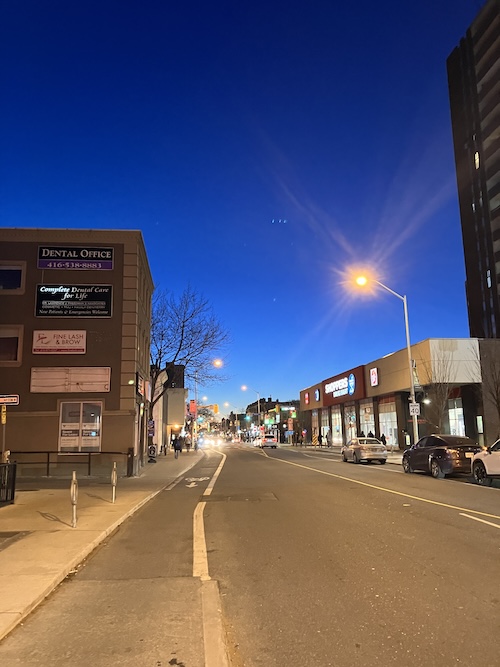
- We are barely allowed joy in this world in these dark times but we are allowed. When you get to your joy don’t feel bad about keeping it as long as you are able. Don’t apologize. You probably didn’t even invite joy. It’s not like a butterfly in a jar. Joy will escape from you no matter how you try and contain it so don’t feel guilty when it arrives. We are barely allowed joy but when you have it you can share it and that helps it remain a few glimmers and sparkles longer. There’s no definitive instruction manual or step-by-step to help you find it or keep it or string it along just a few more minutes. But when you have it, take a minute, drop everything. Drop everything for joy.
- There’s a kind of magic in this wondering, this sending of good wishes to other poets and writers and artists at work in other rooms, other spaces. This connection with others who are drawn to create. This curiosity about what they, and we, will create next. This belief in possibility, and in the value of dreaming “new possibilities,” even though we have “no idea if the ending is a happy one.”
- You might wonder (I did, at first), what the point might be of reading about these views when you can look at them for yourself, albeit by proxy. But there’s something differently but equally magical about Harvey’s descriptions, which convey not just awe or aesthetic appreciation but a profound tenderness for our miraculous, unlikely, impermanent floating home.
- Regular blog readers know that I met my husband when he fixed my fridge. My life might have taken quite a different tack but for the above-board transaction. When I reported to my mother that I’d met someone and how, her first question was “did he charge HST?” He sure did, and I still treasure his invoice from that life-altering day.
- One of the things that I love about lane swimming is that it’s both solitary and communal. I am alone in a giant salty bathtub of friends and strangers.
- Most often when we refer to a treat, our mind immediately goes to food particularly something that may be sweet or decadent (like my homemade dairy-free chocolate & nut covered oatmeal cups). But a treat is also an event or something that gives us pleasure.
- Like a vortex pulling me down, into this moment, my heart began tingling as I arrived back … here. That’s my line. I say it often -“I’ve got nowhere else to be.” But I certainly don’t feel that all the time, with a brain that seems to constantly be asking, “what’s next?” my mind is quite often not where my body is.
- At the start of this new year, which is often the point at which readers and those whose reading has perhaps lapsed make resolutions, we’re cheering everyone on. Whatever the types and numbers of books you read this year or any year, what you’re achieving is excellent. If you need to be reminded of that, hang out with other readers and you’ll feel cheered on, bolstered and encouraged!
- Grandma reminded me that other people are the gold in my life. She reminded me of the gifts within that I had been overlooking—the capacity to listen deeply, for example. The capacity to give my time and attention to others. To create welcoming spaces. To invite response. The joy in that exchange.
- So far, it’s been a grey year…but that’s okay. Grey makes me appreciate the subtle colours of snow, muted bushes, and bare tree branches. After the quiet grey, a blue sky seems garish. Bold. Loud.
- Then there is the actual word ‘retired’. People who dislike the word have come up with alternatives: ‘re-wired’, ‘revived’, ‘renewed’, ‘re-invented’ or ‘re-‘ something or other. But maybe it’s not ‘re’ anything. ‘Re’ in front of a word generally means doing something again. But this is a brand new phase of life. The Spanish word for retirement is ‘jubilación’. Sounds much better, doesn’t it?
February 5, 2024
As Long as the Lemon Trees Grow, by Zoulfa Katouh
It is impossible to read As Long as the Lemon Trees Grow—the debut by YA author Zoulfa Katouh, a 2023 CCBC book award-winner, an OLA White Pine nominee, and a finalist for the 2023 Governor’s General Awards—and not think about what’s happening right now in Gaza. Set over a decade ago in the city of Homs, during Syrian Civil War, the novel is about Salama, who—by virtue of having completed a year of pharmacy school—has stepped up to volunteer at a local hospital, removing shrapnel from people’s bodies, performing amputations without anaesthetic, saving whatever lives she can manage to save, which will never be enough, because she can’t save all of them.
Salama welcomes the distraction of her work at the hospital, which at least feels useful, and takes her mind away from not only the existential threat of death by bombs or snipers at any time, but also the figure of Khawf, an embodiment of her PTSD since the death of her mother and her father and brother’s capture by government forces. But she also feels responsible for her pregnant sister-in-law, who is also her oldest friend, and has not forgotten the promise she’d made to her brother to keep Layla safe, and she is trying to secure passage for her and Layla to make the journey across the Mediterranean Sea for asylum in Europe, though the journey is fraught with risk and Salama is ambivalent about leaving Syria behind, and abandoning the revolutionary cause that had inspired uprisings throughout her homeland.
Woven into this story—almost impossibly, and so gorgeously—is a beautiful love story, as well as a brilliant ode to the transportive powers of imagination in general and the works of Hayao Miyazaki specifically, works that have shown how love and magic are possible in the most unlikely places.
And I do not want to gloss over the book’s specificity, in terms of place and story—this novel is a powerful ode to Syrian culture, a love letter to the place itself, and to the possibility of Syrian emigrants one day returning to the freedom that so many have rallied, fought, and died for.
But it is also such an urgent call for the necessity of a ceasefire in Gaza right now, a testament to the suffering through which so many people are living…and dying. A few weeks ago, I read the words of a doctor in Gaza who’d amputated his own child’s leg on his kitchen table, and I just fell to pieces imagining being in such a situation myself: my child, my table. What’s the difference between him and me? What’s the difference between *this*—caring for children who are victims of chemical attacks, patients whose homes have been reduced to rubble, with babies left to die in their incubators because there are not arms enough to carry them all when the hospital has moments to evacuate before the building is bombed—and that one? This novel is a testament to the absurdity of there being any excuse for human beings to have to live this way, for any person to be so dehumanized that such depravity and barbarism is somehow justified. (Our current moment in which migrants are being vilified at border crossings around the world makes Salama’s story doubly, and even more tragically resonant.)
“If we weren’t in such a dire situation, this place would be beautiful. The blackness stretches out in front of us, with the moon casting his silvery glimmer, dimming the light of the stars nearby. It’s the same sky other people see in their countries. But while we watch it here, hiding, not knowing if our next breath is our last, others sleep safely in their beds, bidding the moon a peaceful good night.”
February 2, 2024
Two New Reviews!
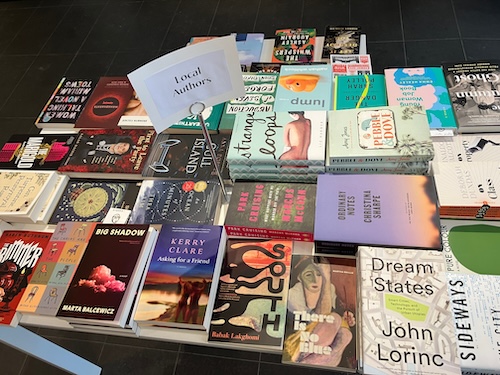
- “I don’t know how to counter-sink a screw, but I like the term, and I enjoy the technical abilities of writers who routinely pull off good prose. Kerry Clare does throughout, and she’s particularly good at writing dialogue. Her characters come across as real people, not puppets, and they sound different from each other. That’s always important, but particularly so when the book is tightly focused on two friends.” New review from Lesley Krueger
- Some people may walk away thinking that Asking for a Friend was written specifically for them – it is that authentic. It felt that way to me. Even though it covers decades, you never feel like Clare is speeding through the story. It is a well written book about a complicated friendship that is hard to let go of and it will one day make a great movie. New review from DIVINE
- Don’t miss the ASKING FOR A FRIEND book club kit!
January 31, 2024
Danielle Steel, and the Person I Used to Be
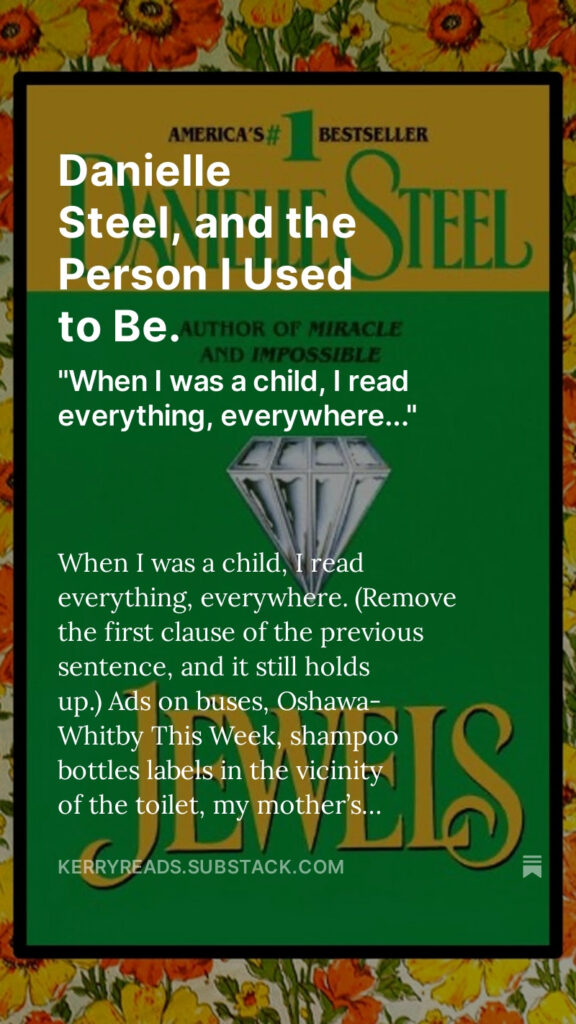
I’ve started 2024 with the intention of doing things differently, channelling the energy I’ve been putting into social media (rendering my thoughts not only fragments, but disposable fragments) into writing one essay every month. This is the first one, and I’m so happy with how it turned out.
January 31, 2024
Ritual
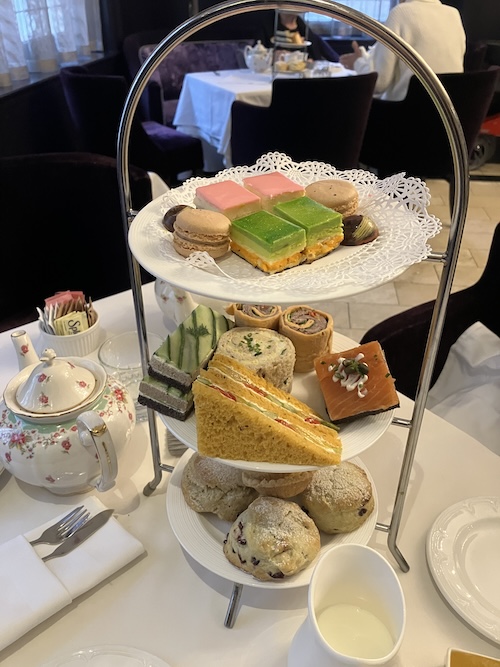
This week, for the second year in a row, my friend and I met for afternoon tea during the final days of January to celebrate having made it through the darkest season. A ritual that’s come about quite naturally—last year we wanted to have tea together and both appreciated how nice it had been to have something to look forward to when the sky was grey and the earth was frozen. I made a point of making it happen again this year because she picked up the bill last time and I wanted to return the favour. And this time we pondered where we’d like to be next year when we do it again, how far we’ve come since last year when we’d sat in that same purple room.
A measurement of how I’ve come is that I didn’t post about the experience on Instagram, which for some people might be unremarkable, but not for me, who had begun to feel that if something hadn’t made it to my grid, it hadn’t actually truly happened, that the post itself was more important than the moment that post commemorated. Especially for afternoon tea, whose aesthetic that Instagram was created for, the algorithm rewarding accordingly.
And I haven’t always felt like this, in fact for a long time it was just the opposite. For a long time, it felt like Instagram actually inspired me to pay attention, to watch the light, for spots of beauty. And yes, there is something shallow-seeming in the Insta aesthetic, in the pursuit of it, but the end result was that there were always tulips on my table and I kept going to beautiful places, and my life was richer and better for those experiences, and others.
But last year I began to feel like I was living my life outside of time, that I was rarely in the moment, and I’d have to check my grid for confirmation of how and what life was, rather than feeling it in my bones. And even when I wasn’t online (I never use the internet on holiday), I felt like my mind was far from present, as though it was always steps behind me, never catching up. I felt as though I were performing my existence, going through the rituals, and the whole thing did look pretty good in photographs, but I didn’t feel great. The meaning drained right out of everything, empty rituals, things I had to do because those were the things I always do.
In the month since I’ve stepped back from obsessively documenting the minutiae of my existence, I’ve felt so much better. Although not always—there have been moments of panic. There’s been FOMO. I got a new hat and it felt weird not be performing my consumerism of a local small business. How weird is that, to perform hat-wearing instead of just, um, wearing a hat? I went to give blood on Saturday for the first time in 20 years and knew I’d be compelled to perform blood-donation, though it turned out not to be issue because my iron was too low. I think a lot of all this started in the pandemic too because performing good citizenship and (hopefully) setting an inspiring example for others had, literally, become a matter of life or death, and then it all got tangled up on my own weird and garbled sense of goodness and virtue. And yes, I always knew the basic truth, which was “ACTUALLY NOBODY CARES,” but then that was hardly a really comforting thought either then, was it?
If a woman has afternoon tea, and no one hears about it on Instagram, did it actually even happen? But it did, and I’m not so evolved that I can restrain myself from writing about it on my blog, but then, what else is a blog for?
January 29, 2024
Interesting Facts About Space, by Emily Austin
I adored Emily Austin’s debut Everyone in This Room Will Someday Be Dead, which I recall reading during the sad pandemic summer of 2021 and being surprised by its capacity to delight me when not much else was doing the trick, and perhaps it was the mordant dread of its depressive protagonist that did it, her willingness to stare the absurdity of life’s darkness in the face—and be funny and achingly human all the while.
Austin’s sophomore novel, Interesting Facts About Space, is even better, the story of Enid, an information architect who works for the National Space Agency who texts her mother interesting facts about space whenever she worries about her, which is always. Because Enid’s mother has long struggled with her mental health, since Enid’s father left them when she was just a child, and Enid has made herself responsible for her mother’s well-being ever since, a Sisyphean task. Just one of many such tasks in Enid’s life, including finding connection on dating apps, overcoming her inexplicable phobia of bald men, resolving her fears that somebody is watching her and moving things around in her apartment when she’s not there, as well as establishing a relationship with her half-sisters, who she’s only just met since her estranged father’s recent death and who have no idea that she’s a lesbian and might react badly if they did. (She also recorded her entire adolescence on Youtube and lost the password so she can’t take the channel down, or resist watching her younger, naive self over and over again.)
Enid is not well, the impacts of trauma in her past finally catching up with her after years of avoidance, and following her along on this journey (while the narrative voice remains breezy and bright) verges toward agonizing. Except that it never gets there, because of how carefully Austin holds her reader’s heart, all the while it’s threatening to break into pieces. This novel is an emotional roller-coaster, about mothers and daughters, sisters, and lovers, and friendship, and what it means to show up for each other, and also to show up for one’s self.
January 25, 2024
The Writing is the Point
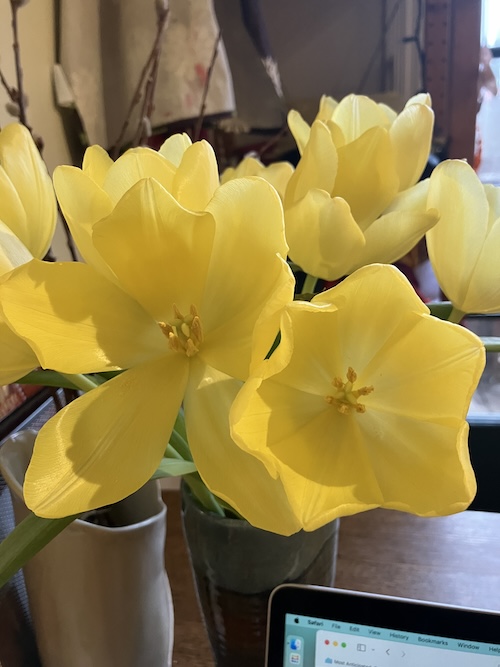
I texted my husband a few months ago with an idea I had for a new novel. He replied with a comment about how he was excited that I was excited about writing something new. “I bet you are, ha ha,” I wrote back, because he’d been the one to console me through my months of post-publication ennui, but he affirmed that he really meant it, because he knows that writing is a thing I do, even if it’s not a wise thing, and certainly not a financially lucrative thing, even if publication itself is not a destination that delivers me much in the way of satisfaction and contentment. And that is why I love him, and this is what love is, I think, someone who gives you permission to make bad choices that are the right choices, because even though they might know better, they also understand.
Towards the end of December, I was feeling paralyzed creatively, any confidence I’d felt in my abilities and expertise totally zapped by how hard it had been to publish my latest novel. I felt like a fraud. It was painful, and dispiriting, and I’m so grateful for the long break I took over the holidays, to retreat from the FOMO of the online world and take solace in actual real life people (to quote a certain Anna) and a huge pile of books, to feel my soul grow back, and begin to feel creative and inspired again.
In 2021, I hadn’t been without a project in years. I started Mitzi Bytes in 2014, I started Asking for a Friend in 2015, published Mitzi Bytes in 2017, and started Waiting for a Star to Fall in 2018. That makes for almost a decade with something creative waiting in my back pocket, an easy answer to the question, are you working on something new? Plus there was a global pandemic still going on and, though I didn’t know it at the time, I was well on my way to a mental health crisis that was going to break my brain, so it’s not so surprising that I was having some trouble thinking up a new idea for a book.
Somehow I broke through that pressure, however, and started writing a novel about a woman who has just left (exploded) her marriage and who begins a new life in a Toronto rooming house, a novel about a character I’d envisioned as a modern day Barbara Pym heroine. I had a framework for the novel, 12 chapters, each one taking place over a month, the entire novel the course of a year. The trouble started, however, when I’d reached 70,000 words and wasn’t even six months in, plus the problem of there being no plot. So I abandoned that project, and decided I would write a thriller, but then that fell apart, and then I fell apart. Speaking of paralyzed.
Imagine my surprise, however, when I reread the modern-day Pym book a year later…and realized it was really good? (It was really good because, though my crippling self-doubt of last fall would tell me otherwise, I’ve figured out a thing or two about writing novels, and also because I started writing it under the influence of Katherine Heiny, whose work has taught essential things about enlivening fiction and highlighting the absurdity of everyday life). I decided to abandon the 12 chapter framework, broke the chapters down into smaller pieces, conceded that a literary arc could be possible in a six month period, and just fell deeper and deeper in love with Clemence Lathbury and her world.
Last year I set to revising the manuscript, in between edits and revisions on Asking for a Friend, preparing for that book’s publication, and working with manuscript consultation clients…and I didn’t get much done. Something was missing, and I didn’t know what it was. I didn’t have the focus. Maybe there’d been nothing there there after all? But the bits of dabbling I was doing over the fall suggested otherwise. At the end of December, as I recovered from a difficult season and prepared to start creating again—remember, I had this idea for another new novel, this one a family saga—I set a goal of first getting Clemence’s story into fighting form by the end of January, if such a thing was even possible. Was it possible?
But reader, I did it! Yesterday I added the final link in the thread that had been missing from my narrative, and today I read the final chapter and the epilogue, and was just absolutely dazzled by the ending, which I’d forgotten altogether, and I was properly impressed with myself for pulling it off. I begin working with manuscript consultation clients for the next two months, but will commit to a read-through in April, after which point I will likely (!) send it off to my agent. The prospect of which terrifies me to no end, because while I think that my agent will like it, and that it’s the best book I’ve ever written (so fun! so smart! so full of humour and light!) I’m also the author of three poor-selling novels, which is not a stellar track record, and the deeper on gets on that path, the harder it becomes to change course. Sigh.
But right now, I’m choosing not to focus on that, instead to celebrate my win of getting to this finish light, amidst global crises, and mental health breakdowns: I have written another novel and I really really love it. I am also having fun putting together my new newsletter, and I’m recording the first interview for my new podcast tomorrow! And at some point in the next few months, I’m going to start writing that family saga, and maybe I won’t be able to pull it off, and maybe no one’s going to want to publish it even if I do, a challenge I’ll face if and when it arrives, but in the meantime I will do what I do, which is write, because I love to write, because the writing is the point.
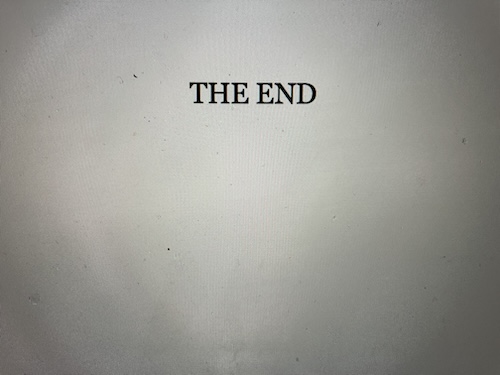
January 23, 2024
Gleanings
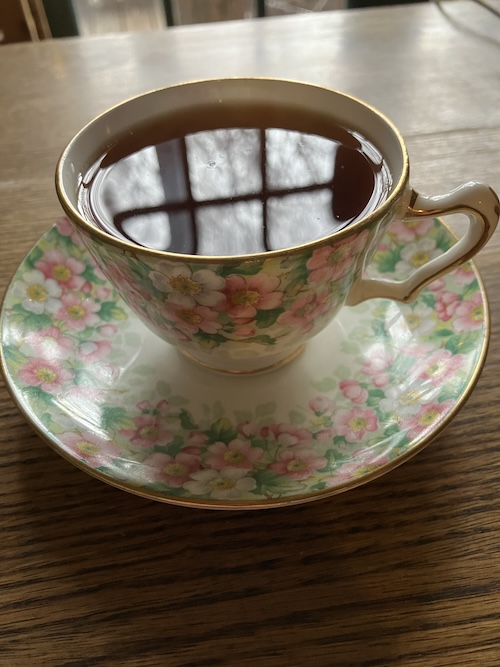
- But once the pianist played our opening and we assumed our positions, then began to move in formation as a real corps de ballet, I stopped thinking about how I might be perceived. Instead, I smiled, breathed in, imagined the top of my head reaching toward the ceiling and let my body present the movements it had been perfecting all week. I stopped judging my every bodily infelicity, quieted any fears and just danced, suspended in time.
- And so yeah, I love my own books, and I want them to be successful but I just…cannot get very fussed about it. Mainly…every now and then I’m still fussed. But really–just what are the odds! If you have seen what I’ve seen–which is actually NOT all the books published in the English-speaking world in a year, but a fair percentage of them–you just can’t get that upset anymore. You still work hard–I still work hard–but like Le Petit Prince on his tiny planet (why are so many things like Le Petit Prince to me?)…it’s an odd perspective
- A middle-aged woman being a life coach is a laughingstock. I know it. We all know it. (I’m Not Sorry About Being a Coach)
- So here I am, feeling a bit shaky like James, falling into your arms. My dad has dementia. It is terrible and often beautiful in totally surprising ways. I’d like to write more about it here. I hope that will be as healing for some of you as I know it probably will be for me.
- I am from the hot desert sand, from where palm trees sway/ Heavy with fresh, golden dates hanging just out of reach./ I am from mudpies, made outside while parents napped./ And the sun beat down on our bare, unprotected brown skin.
- This book of mine pays tribute to poets adults read—Elizabeth Bishop, Emily Dickinson, Mary Oliver—but also to Margaret Wise Brown. You are never too young for the rapture of language—or too old to let it take you somewhere entirely new.
- This is going to sound so trite, so petty, but…I actually feel bad for them. What a sad little world they’ve created, where perfection is the thing that matters. Where the ability to Control your Human-ness is rewarded. To earn your spot here, you must be able to push down your fear, your flaws, your idiosyncrasies, your pain, your personality. Please be a machine, with just the right amount of “musicality.”
- My lobster is out there. Who knows, I may have already met him. But, rest assured, I haven’t waited this long, or done the inner work or, frankly, endured the experiences I have to be disappointed. My person is out there, just waiting for me to make space for them in my life and in my heart.
- You are the original Teflon. You sear meat, reduce a sauce, sweat an onion, and yes, dear cast iron pan, you’ll fry my morning egg.
- In moments like these I start to doubt even “reasonable hope.” I have to admit it. When you see such horror and unjust actions. And, yet, part of me believes that we cannot move forward without some element of hope. What is reasonable hope at the moment? Very difficult to describe. But I communicate with Palestinian and Jewish friends of good will. Notwithstanding the context, they give me hope. Notwithstanding the tears they shed and the sorrow they go through, I can feel hope in their words. I hope I am being reasonable!
- My bridge tales come directly from my heart and my imagination. I just hope I have the fortitude and competence to get this project across the finish line which, for me, would be taking it to the printer.
- I’m glad to have a place to hang up my hat, both literally and figuratively.
- But what I’m wondering, these days, is how to model the behaviour of reading more? In the summer, I’m going to try and read more in public spaces and on park benches. Maybe until then I’ll read in cafes and in libraries.
- When you’re the one who doesn’t leave … you always wonder – what it would be like if you left? Wonder what it would be like if you were elsewhere. Especially when you were the teenager who couldn’t wait to get outta this place …
- I’m really proud of my day, of the feelings of achievement I have for resting, the creativity seeping through as cracks start to appear in the bed of tight, tense perfectionism.
- i can get really tired of people thinking i’m odd. i’m only as odd as the next guy. and i’m not talking about the naked guy at the beach. It gets old, and being embarassed is not that good a feeling, it seems to ride side-saddle to shame.
